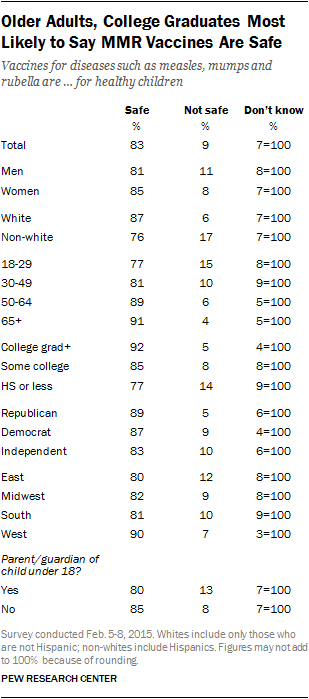The weekly report on research and demographics of the secular movement
by Julie Esris
At the end of June 2015, California passed a law that makes vaccinations mandatory for all schoolchildren, regardless of their parentsÔÇÖ religious beliefs, personal beliefs, or skepticism about the safety of vaccines. The only time a child attending school may be exempt from vaccination would be if the child has a medical condition in which vaccinations would pose a threat (such as in immunocompromised children). Over the past several years, whether or not to vaccinate oneÔÇÖs children has become a contentious and divisive issue. While it is old news that some people choose not to vaccinate their children for religious reasons, much more recently many parents have opted out of vaccinations out of fear. In 1998, Dr. Andrew Wakefield published a paper that claimed the MMR vaccine causes autism. The research was found to be fraudulent and Dr. WakefieldÔÇÖs medical license was revoked. However, the damage had already been done. Some parents remain convinced by WakefieldÔÇÖs paper. More parents, however, simply distrust pharmaceutical companies and are skeptical about the effectiveness and safety of vaccines. As a result, there has been a significant increase in cases of measles in the United States.
A Pew poll released in February 2015 asked respondents about their perceived safety of vaccines. The study revealed that 83% of respondents believe that vaccines are safe. 9% believe that they are unsafe, and 7% are undecided. This overwhelming approval knows no significant partisan or demographic bounds. However, those who are more skeptical about vaccinesÔÇÖ safety tend to be less educated. 92% of college graduates believe that vaccines are safe. This number drops to 85% of those who have had only some college education, and dips to 77% for those with a high school degree or less. Age is also a factor, with younger adults (77% of those aged 18-29) being less inclined than older adults (90% of those 50 and older) to trust vaccines.
There is a slight disparity in vaccine approval between ethnic groups, political affiliation, gender, location, and parental status. 87% of whites versus 76% of non-whites approve of vaccination. 89% of Republicans, 87% of Democrats, and 83% of independents trust vaccines. Women (85%) feel safer with vaccination more than men (81%). Those who live in the American East, South, and Midwest believe in vaccinesÔÇÖ safety at rates of 80%, 81%, and 82%, respectively. 90% of those surveyed on the west coast say that vaccination is safe. Additionally, parents of children under eighteen are slightly less likely (80%) than those without children under eighteen (85%) to trust vaccination.
Although the disparities between ethnic groups, political affiliation, gender, location, and parental status are relatively small, they are still worth considering. Compared to the other disparities between groups, the rate of trusting vaccinations between whites and non-whites is significant. Unfortunately, this poll did not refer to specific minority groups, only ÔÇ£non-whitesÔÇØ. Black people, for example, could have a good reason to mistrust the pharmaceutical industry. As if this group has not suffered enough injustices over the centuries, there was the appalling ÔÇô and relatively recentÔÇöTuskegee syphilis experiment. This clinical study, conducted between 1932 and 1972, followed the progression of untreated syphilis in black men in rural AlabamaÔÇöwithout their consent. Although penicillin was already proven to be an effective treatment, none of the researchers gave it to any of the infected men. It is worth asking if this study has impacted minoritiesÔÇÖ trustÔÇöor at least blacksÔÇÖ trustÔÇöof vaccinations.┬á
Although many people who mistrust vaccinations tend to be less educated, this study also illustrates that some tend to be younger and left-leaning. This could simply be a case of group identity. Occasionally, younger people believe that left-leaning means challenging anything that is an established norm. Vaccines have been the norm for over a century, and are thus a perfect target for a sort of ÔÇ£liberal skepticismÔÇØ, which could be part of a group identity for left-leaning young people. This sort of mentality may go hand-in-hand with a general mistrust of the government as well as the pharmaceutical industry, an industry that profits from selling treatments of diseases. It may be tempting to think that this profit motive leads the industry to produce treatments that only exacerbate certain medical problems, and that the cure is another ÔÇ£treatmentÔÇØ. There are even some individuals who believe that vaccinations are a government conspiracy to keep people sick and therefore subjugated.
It is disheartening to learn that some Americans believe that vaccinations are unsafe, but the fact that most do believe that they are safe is encouraging. Perhaps when the new law in California correlates with a significant drop in cases of measles, former vaccine skeptics will change their minds. It is also important to remember that there will always be conspiracy theorists as well as people who panic about certain issues despite reassurance from the experts.
After all, there was a time when many people wouldnÔÇÖt listen when scientists assured them that they could not catch the HIV virus from casual contact.
